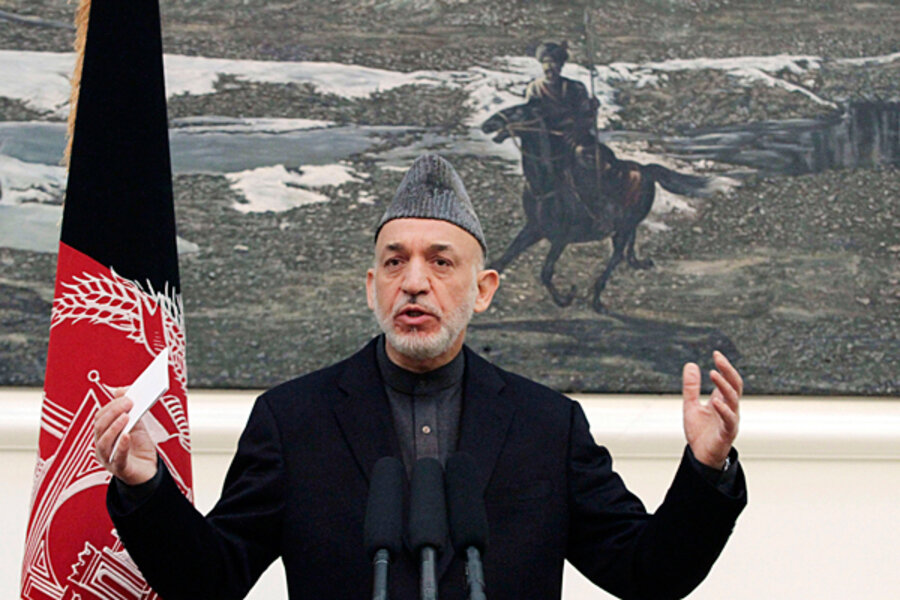Afghan president orders US troops out of volatile province on Kabul's flank
Loading...
| Kabul, Afghanistan
The Afghan government has demanded that US Special Forces leave a strategic province that lies just to the west of Kabul, claiming in a written statement that American soldiers operating in the region have been “torturing and even murdering innocent people.” The US-led coalition denies the claims.
The Afghan government’s announcement, which was made on Sunday, ordered Special Forces from the United States – but not necessarily other countries – to immediately cease operations in Wardak Province and to entirely leave the area within two weeks.
In a press conference following the release of the statement, Aimal Faizi, the spokesman for Afghan President Hamid Karzai, suggested that Afghan nationals working with US Special Forces were thought to have committed the violent acts against civilians, not necessarily American soldiers themselves. But the order for US Special Forces to withdraw from Wardak remains intact.
Given Wardak’s proximity to Kabul, the prospect of an American departure from the province has raised concern about how security might be affected in the capital city. Just hours before the Afghan government’s announcement Sunday, Afghan security forces shot dead a suicide bomber who was targeting an intelligence agency office located in Kabul’s diplomatic quarter. Coordinated suicide bombs in two other eastern cities killed three and injured seven within hours of the foiled Kabul attack.
“This decision will have a huge impact on the security situation in Kabul,” says Waliullah Rahmani, a security analyst with the Kabul Center for Strategic Studies. “Wardak is one of the most volatile provinces. It is a center for the insurgency, which is mainly focused on Kabul.... I don't know why the Afghan president has come to reach such a risky decision.”
The Afghan government cited two examples of alleged abuses by US Special Forces, including one in which nine people “were disappeared” and another in which a student was taken from his home and found dead two days later, his throat slit. Such episodes have generated “resentment and hatred” among the people living in Wardak Province, a government statement said.
Coalition disputes claims
The US-led coalition says that such claims are unfounded.
“We looked into the allegations and found no supporting evidence for them,” Brig. Gen. Günter Katz, a spokesman for the International Security Assistance Force (ISAF), told a press conference in Kabul on Monday morning.
“Afghan officials and ISAF officials are planning talks to discuss the allegations of wrongdoing that were announced yesterday,” he added. “ISAF takes all allegations of misconduct seriously.”
Wardak Province is a mountainous region whose eastern border lies just 25 miles to the west of Kabul. The province has been the scene of a number of insurgent attacks since the Taliban gained control of Wardak’s remote Tangi Valley nearly two years ago.
The Taliban shot down a US military helicopter in Wardak in August 2011, killing 38 US and Afghan soldiers. An American woman and her Canadian husband disappeared from the region in October of last year; they haven’t been heard from since.
Whether or not US Special Forces leave Wardak within two weeks, they will almost certainly be out of the province by the end of 2014, in accordance with international plans to withdraw foreign troops and allow Afghan forces to take control of the country’s security.
Speaking to reporters on Monday, Katz stressed that those plans are still moving ahead.
“The [Afghan National Security Forces] are doing very well in pressuring the insurgency,” Katz said. “The transition process is very well on track and the Afghans are fighting well.”
To the people of Wardak, the transition may not come soon enough.
“The US Special Forces have made things more dangerous here,” Saeed Hashem, a pharmacist, said by phone from Wardak, adding that many people in the region are afraid to leave their houses for fear of potential attacks. “The Afghan forces should take over control,” he said. “When that happens, we will be able to defeat the Taliban and the other enemy groups, and Wardak will be safe.”





